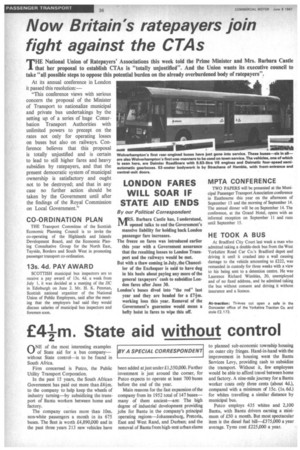fitim. State aid without control
Page 38

If you've noticed an error in this article please click here to report it so we can fix it.
BY .A SPECIAL CORRESPONDENT
ONE of the most interesting examples of State aid for a bus company— without State control—is to be found in South Africa.
Firm concerned is Putco, the Public Utility Transport Corporation.
In the past 15 years, the South African Government has paid out more than £4+m. to the company to help keep the wheels of industry turning—by subsidizing the transport of Bantu workers between home and factory.
The company carries more than 10m. non-white passengers a month in its 675 buses. The fleet is worth £4,890,000 and in the past three years 213 new vehicles have been added at just under £1,550,000. Further investment is just around the corner, for Putco expects to operate at least 700 buses before the end of the year.
Main reasons for the fast expansion of the company from its 1952 total of 147 buses— many of them ancient—are: The high degree of industrial development providing jobs for Bantu in the company's principal operating regions—Johannesburg, Pretoria, East and West Rand, and Durban; and the removal of Bantu from high-rent urban slums to planned sub-economic township housing on outer city fringes. Hand-in-hand with the improvement in housing went the Bantu Services Levy, providing cash to subsidize the transport. Without it, few employees would be able to afford travel between home and factory. A nine-mile journey for a Bantu worker costs only three cents (about 4d.), compared with a minimum of 15c. (1s. 6d.) for whites travelling a similar distance by municipal bus.
Putco employs 435 whites and 2,100 Bantu, with Bantu drivers earning a minimum of £50 a month. But most spectacular item is the diesel fuel bill—£375,000 a year average. Tyres cost £225,000 a year.




























































































































